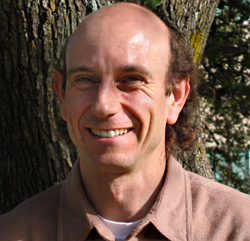Prof Honored for Ability to Unlock Secrets of Physics
 Dr. Joseph Izen, professor of physics at UT Dallas, is one of two faculty members to receive a 2012 Regents’ Outstanding Teaching Award, which recognizes extraordinary performance and dedication to excellence in the classroom.
Dr. Joseph Izen, professor of physics at UT Dallas, is one of two faculty members to receive a 2012 Regents’ Outstanding Teaching Award, which recognizes extraordinary performance and dedication to excellence in the classroom.
A total of 65 educators from institutions within the University of Texas System received the 2012 award, which is the highest honor given by the UT System Board of Regents.
Izen learned of his Regents’ Award selection while working on an experiment called ATLAS at the Large Hadron Collider at CERN, the European Laboratory for Particle Physics located near Geneva, Switzerland. As a member of the ATLAS team, Izen was part of an international research collaboration that recently found compelling evidence for the Higgs boson, a long-sought-after elementary particle.
That discovery offered opportunities to combine two things he enjoys – research and teaching.
“After I returned from CERN, some students from my quantum mechanics class saw me in the hallway for the first time since the Higgs announcement,” Izen said. “They just tackled me, and we discussed the findings for about half an hour. Is that teaching, or is that research? Sometimes the line is gray.”
Izen has been on the UT Dallas faculty since 1991, and he teaches both undergraduate and graduate classes. He said his favorite classes to teach are those that were important to him as he “learned to think like a physicist.”
“The advanced physics courses I enjoy teaching the most reveal things that are not so apparent in daily life, such as quantum physics,” he said. “At the other end of the spectrum, nothing compares with the impact of a physics professor teaching the first calculus-based physics course for science and engineering students. You are their guide for the transition from fact-memorizers to critical thinkers. Everyone remembers their first physics professor — sometimes in embarrassing detail.”
“It’s satisfying to be that professor who bridges the gap,” Izen said. “I come in knowing that it’s not going to be an easy class. I use a lot of demonstrations and in-class concept questions to make each class both challenging and fun so that my students will want to work a bit harder.”
Izen said he also relishes the opportunity a heckling student presents. “When I get a student like that, it really is a gift, in a peculiar way,” he said. “Advanced theory can be dry, but tracking the word play in a dual of wits between their professor and one of their own keeps my students alert during long derivations. Interestingly, students who try to give me a hard time seem to feel honor-bound to give me their best effort.”







